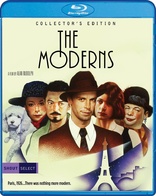The Moderns Blu-ray Movie
HomeThe Moderns Blu-ray Movie 
Collector's EditionShout Factory | 1988 | 126 min | Rated R | Sep 19, 2017
Movie rating
6.6 | / 10 |
Blu-ray rating
| Users | 0.0 | |
| Reviewer | 3.5 | |
| Overall | 3.5 |
Overview
The Moderns (1988)
In the Roaring Twenties, aspiring painter Nick Hart (Keith Carradine), a U.S. expat who has decamped to Paris, tries to scrape together a living. He has a talent for reproductions but his own work is not selling well, so he takes a job forging famous paintings for rich art patron Nathalie de Ville (Geraldine Chaplin). However, things get awkward when Hart's ex-wife, Rachel (Linda Fiorentino), shows up with her new husband, Bertram Stone (John Lone), who attempts to buy the counterfeits.
Starring: Keith Carradine, Linda Fiorentino, Wallace Shawn, Geneviève Bujold, Geraldine ChaplinDirector: Alan Rudolph
| Drama | Uncertain |
| Romance | Uncertain |
| Period | Uncertain |
| Comedy | Uncertain |
Specifications
Video
Video codec: MPEG-4 AVC
Video resolution: 1080p
Aspect ratio: 1.85:1
Original aspect ratio: 1.85:1
Audio
English: DTS-HD Master Audio 5.1 (48kHz, 24-bit)
English: DTS-HD Master Audio 2.0 (48kHz, 24-bit)
5.1: 3493 kbps; 2.0: 1987 kbps
Subtitles
English SDH
Discs
Blu-ray Disc
Single disc (1 BD)
Playback
Region A (B, C untested)
Review
Rating summary
| Movie | 4.0 | |
| Video | 3.0 | |
| Audio | 4.0 | |
| Extras | 3.5 | |
| Overall | 3.5 |
The Moderns Blu-ray Movie Review
Reviewed by Dr. Stephen Larson March 10, 2018In watching Shout Select's recently produced documentary, Art and Artifice, which chronicles the making of Alan Rudolph's The Moderns (1988), one gains appreciation and admiration for the myriad obstacles that director Rudolph and his filmmaking team overcame to bring this long-stalled project to the screen. Eighteen years in the making, The Moderns was the first script that Rudolph wrote before directing his inaugural film Premonition in 1972. The script went through various changes through the years, particularly when Rudolph's mentor Robert Altman tried pitching it to indie production companies for him in the mid-eighties. When it received no takers, Altman suggested some rewrites and so-called gonzo journalist Jon Bradshaw was brought in to spruce it up. (Bradshaw sadly would not not live to see the finished film. He passed in late 1986.) Carolyn Pfeiffer, Bradshaw's widow, and producing partner David Blocker agreed to finance the film through their company, Nelson Entertainment. According to a Pfeiffer in a new interview on this disc, the picture cost $3.5 million to make. Star Keith Carradine, who like Rudolph was an alumnus of the Altman School having worked on Nashville (1975), had agreed in the years prior to have a leading role in The Moderns, a commitment that he kept.
The Moderns may be a portrait of late 1920s Paris but Rudolph never intended it to be a quasi-documentary of the period. (The movie was shot entirely in Montréal.) The film does include portrayals of the historical personages of Ernest Hemingway (shown in an often inebriated state by Kevin J. O'Connor), Gertrude Stein (a manish Elsa Raven), Alice B. Toklas (Ali Giron) as well as fictional characters based on real-life figures of that era. Yet Rudolph is more interested in the labels that the characters attach to such binaries as art vs. commerce and authentic vs. counterfeit. He also revels in the distinctions, obfuscations, and confusions that characters bring to their (mis)understanding of objets d'art as well as to each other.
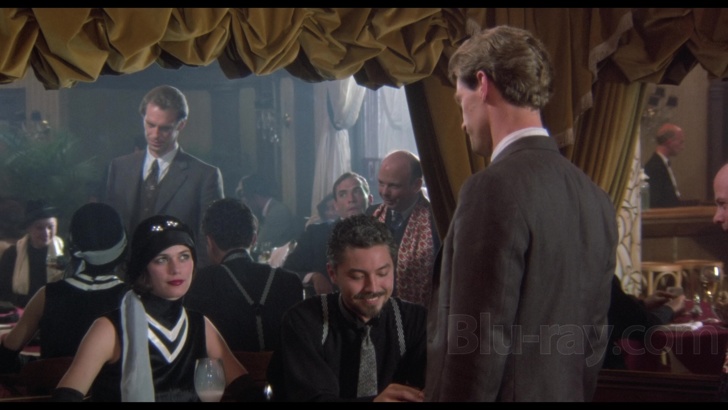
An early scene from The Moderns
Caricaturist Nick Hart (Carradine) is one of many American expatriates attempting to cut their teeth through the Paris art world. The Selavy Café becomes a regular hangout for Hart and his friend/colleague from the New York Herald Tribune, gossip columnist Oiseau (Wallace Shawn). There Hart spots an old flame from his days in Chicago, the luscious Rachel Stone (Linda Fiorentino). Rachel was apparently once engaged to Nick but is now married and living in Paris with Bertram Stone (John Lone), a self-proclaimed rubber baron and prophylactics manufacturer. Bertram is wealthy and successful but he's also a shady businessman and odious husband to Rachel. Nick envisions getting his beautiful lady back from supercilious Bertram and partakes in a forgery scheme with the struggling art collector Libby Valentin (Geneviève Bujold). Following in the same footsteps as his art forger father, Nick paints reproductions of Cézanne, Modigliani, and Matisse, which he'll try to sell to Bertram as the original masterpieces. Nick also has to deal with the Parisienne and dilettante Nathalie de Ville (Geraldine Chaplin), whose seems equally interested in him as a romantic as much as an artist. Though The Moderns divided critics during its initial release, it is a nostalgic and wonderfully made period drama that has grown on me since I first saw it.
The Moderns Blu-ray Movie, Video Quality 
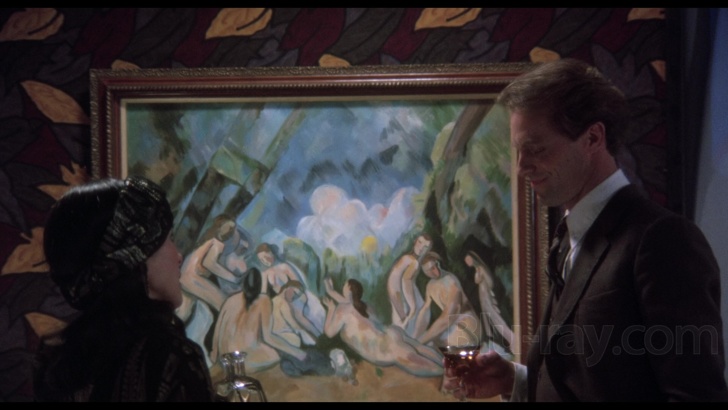
The Moderns arrives as a "Collector's Edition" in Shout Select's line, officially listed as #30 in the boutique label's series. According to Shout's press notes, the thirty-year-old movie has been given a newly remastered 2K scan from the original film elements and an interpositive. Shout has encoded a BD-50 that sports an MPEG-4 AVC transfer for the feature, which carries an average video bitrate of 29991 kbps and a total bitrate of 37.65 Mbps for the full disc. How did The Moderns first look when it screened for critics in spring 1988? The Washington Post's Desson Howe praised Toyomichi Kurita's cinematography which "exquisitely crosses color with sepia and blacks and whites; you feel as if you're on an impressionist's canvas and -- at other times -- in an antique photo of Paris streetlife." Pittsburgh-based reviewer Ed Blank noted the darker aspects of the photography: "the smoky gray-and-cinnamon variety that is so dark that you think your specs need cleaning."
With the exception of blemishes that often crop up on the print, Shout's transfer (presented in about 1.85:1) has faithfully replicated the film's theatrical appearance. I own the 2002 MGM DVD and can recall vividly the sepia-tones as Rudolph and Kurita gradually transition from black-and-white to color. The color palette, however, looked drab (even the warmer tones) and one can notice the corrections in color temperature throughout these screenshots (especially the paintings). Shout has kept grain intact and one can easily spot a smattering in compositions made up of black and brown hues as well as bolder colors. Grain structure is scattered and not always consistent, though. The downside to the transfer is the high frequency of both black and white speckles across the film. So this is not a complete restoration and these blips could have been expunged before the final encode was made. My video score is 3.25.
Twelve chapter selections are accessible through the main menu or via remote control.
The Moderns Blu-ray Movie, Audio Quality 
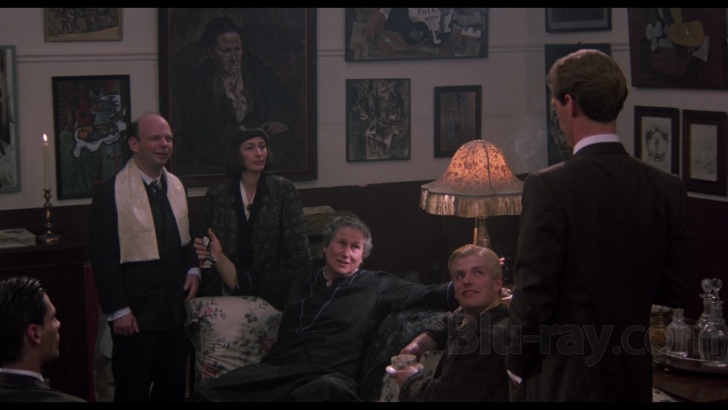
Shout has included The Moderns's original Dolby Stereo as a DTS-HD Master Audio 2.0 (1987 kbps, 24-bit) and a 5.1 remix at the healthy bitrate of 3493 kbps. I listened to the latter and the source material's in relatively good shape. It it a dialogue-driven film so much of the chatter is relegated to the front. The sound track's highlights reside with the period songs and Mark Isham's original score. Tunes comprise those written or performed by Josephine Baker, Charlélie Couture, Jean Lenoir, and an abridged rendition of Puccini's "Madame Butterfly." Isham's music has great variety as it intermixes piano, violin, and bass.
Optional English SDH are available for the feature.
The Moderns Blu-ray Movie, Special Features and Extras 
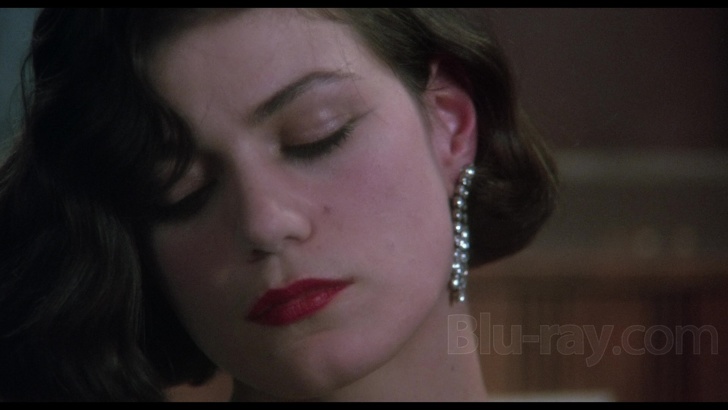
- NEW Art and Artifice in The Moderns (1:36:35, 1080p) - this recent retrospective documentary on the making of The Moderns contains interviews with director Alan Rudolph, producer Carolyn Pfeiffer, and actor Keith Carradine. Shout intercuts each interviewee's remarks with behind-the-scenes photos (including Polaroids), production stills, and clips from the film. The very soft-spoken Rudolph has many anecdotes to share from his long career. His comments are complimented by Carradine's philosophical musings about art and design as well as by Pfeiffer's solid recollections of getting the film made. In English, not subtitled.
- Theatrical Trailer (2:05, upconverted to 1080) - an unrestored and upscaled trailer that ran before The Moderns was released into theaters.
The Moderns Blu-ray Movie, Overall Score and Recommendation 
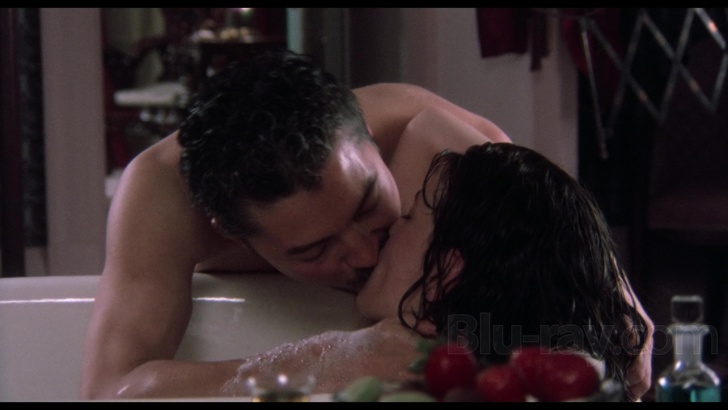
The Moderns has aged well and would make a terrific double bill with Allen's Midnight in Paris (2011). I have some misgivings about Shout not eliminating some persistent dirt on the print that they used for the transfer. Still, the transfer looks markedly better than the DVD and the audio has been upgraded as well. Shout has put together a very good making-of-doc which takes the place of a commentary. I would have liked to hear more about how John Lone was cast though we learn who was originally considered for the role of Bertram. RECOMMENDED to fans of Rudolph, Carradine, Fiorentino, G. Chaplin, and Lone.
Similar titles
Similar titles you might also like

The Artist
2011

A Woman of Paris
1976 Rerelease Version with Charlie Chaplin and Timothy Brock scores
1923

Midnight in Paris
2011

The Carpetbaggers
1964

The Devil Is a Woman
1935

Frances Ha
2012

Shampoo
1975

Quartet
1981

Lonesome
1928

Coco Chanel & Igor Stravinsky
2009

The Gold Rush
1925 and 1942 Versions
1925

Sunrise
Sunrise: A Song of Two Humans
1927

My Beautiful Laundrette
1985

City Girl
1930

Stolen Kisses 4K
Baisers volés
1968

Fedora
1978

You're a Big Boy Now
Warner Archive Collection
1966

Before Sunrise
1995

Before Midnight
2013

Howards End 4K
1992
